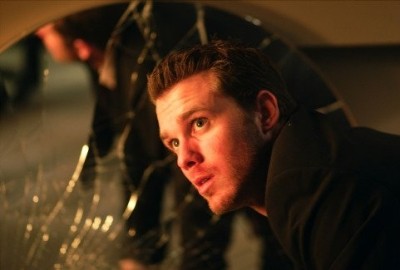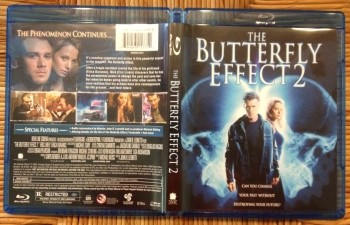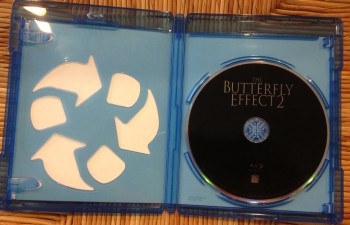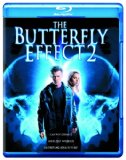| Reviews & Columns |
|
Reviews DVD TV on DVD Blu-ray 4K UHD International DVDs In Theaters Reviews by Studio Video Games Features Collector Series DVDs Easter Egg Database Interviews DVD Talk Radio Feature Articles Columns Anime Talk DVD Savant Horror DVDs The M.O.D. Squad Art House HD Talk Silent DVD
|
DVD Talk Forum |
|
|
| Resources |
|
DVD Price Search Customer Service #'s RCE Info Links |
|
Columns
|
|
|
Butterfly Effect 2, The
Warner Bros. // R // July 17, 2012
List Price: $19.98 [Buy now and save at Amazon]
The Film:
 In the original Butterfly Effect, a tormented college student with repressed memories discovers a newfound ability to tap into mental blank spaces and, through quantum leaps fueled by reading journals from his youth, make life-altering changes around said memories. To do so isn't wise, but it's born of motorized desperation and necessity to erase the sudden death of a friend, and it's only in the wake of the alternate universe's consequences that he realizes he's got to do it again to fix the new messes he created. Thus starts a continual tumble down a metaphysical rabbit hole, which has garnered a cult following of sorts for Eric Bress and J. Mackye Gruber's chaotic and melodramatic exploration of time-tampering. But one thing's fairly certain at the end of the first film (especially in the director's cut): there's little room for a sequel. So how -- and why -- do we have The Butterfly Effect 2, which does the same things as its predecessor on a more emotionally vain, mentally stale level?
In the original Butterfly Effect, a tormented college student with repressed memories discovers a newfound ability to tap into mental blank spaces and, through quantum leaps fueled by reading journals from his youth, make life-altering changes around said memories. To do so isn't wise, but it's born of motorized desperation and necessity to erase the sudden death of a friend, and it's only in the wake of the alternate universe's consequences that he realizes he's got to do it again to fix the new messes he created. Thus starts a continual tumble down a metaphysical rabbit hole, which has garnered a cult following of sorts for Eric Bress and J. Mackye Gruber's chaotic and melodramatic exploration of time-tampering. But one thing's fairly certain at the end of the first film (especially in the director's cut): there's little room for a sequel. So how -- and why -- do we have The Butterfly Effect 2, which does the same things as its predecessor on a more emotionally vain, mentally stale level?
Essentially, director John R. Leonetti microwaves the same twists and turns as its predecessor -- unexpected deaths, alternate universes, suspense driven by the changes -- and serves them alongside a new, completely-detached protagonist, Nick (Eric Lively). While on vacation celebrating his girlfriend's (Erica Durance, Beyond Sherwood Forest) birthday with two of their friends, a tragic car accident leaves only Nick alive. Naturally, he's grief-stricken, which affects his performance at the start-up software company where he works, allowing a rival employee to advance ahead of him and, quite forcibly, make Nick's life difficult. One night, after perusing photos while drowning his sorrows with beer, he focuses on one of the photographs -- a shot taken shortly before the car wreck -- and, after the room starts to rumble in signature Butterfly Effect fashion, he's transported to that time and place. Only, it's not just a memory: he's able to relive and modify the wreck's outcome, discovered once he snaps out of the memory to find everything's changed.
Immediacy drives the first Butterfly Effect, in the sense that Evan Treborn's motives revolve around righting the causal wrongs he creates in a cascade of alternate universes. Momentum is created as he attempts to control fate's uncontrollable current with noble actions, which is something Nick's emptier chronicle of comparable choices doesn't achieve. The Butterfly Effect 2 lets him get a bit trigger-happy: instead of genuine, fraught desperation being the sole reason he saves the physical lives of those caught in the uncontrollable blowback of his meddling, his impulses lead to him rashly use his memories, from only a year previous, to manipulate and improve the course of his life -- namely his professional/corporate success -- at a meager low point that really doesn't earn the necessity for a life-altering reboot. Discouraging events occur, sure, and changing one's financial outlook brings the Chaos Theory concept to a relatable, less-dramatic level, but it also chases away the story's affective clarity as Nick decides to fold when life deals him a less-than-satisfying hand. And, no, its lengthy Skinemax-caliber love scenes do not help matters.
necessity for a life-altering reboot. Discouraging events occur, sure, and changing one's financial outlook brings the Chaos Theory concept to a relatable, less-dramatic level, but it also chases away the story's affective clarity as Nick decides to fold when life deals him a less-than-satisfying hand. And, no, its lengthy Skinemax-caliber love scenes do not help matters.
What's more, Nick's hasty, unthinking decisions within the fabric of his new realities are what create the situations he has to fix, instead of rectifying the mere repercussions of somewhat noble changes. This mutes most of the connection one might have with The Butterfly Effect 2; Nick doesn't know when to keep his mouth shut or when to keep his, uh, baser impulses bottled up, which gives us a character that makes voluntary -- and foolish -- decisions that self-create the hell that he has to keep fixing. It doesn't help that Eric Lively doesn't earn much empathy as the new, disjointed protagonist, leaving the scenes where he's swimming in booze and shedding tears as strained, fruitless attempts to give his screw-ups more import. Helplessness and empathy should become prevalent once the story lumbers towards its finale through a dystopian environment full of gunfire, volatile investors, and attempted memory jumps through photos on a cellphone, but all this direct-to-video sequel creates is a sense of frustration with someone unmindful of fate's frailty.
Really, Nick's mind really isn't an intriguing space to navigate in the first place, and the scenario garners such a paltry amount of weight that the ending, double-backing to one with similar machinations as the original Butterfly Effect, leaves a sour aftertaste in the wake of deflated purpose and inane decisions. The haunting memories from a man's childhood and some semblance of a genealogical mythos creates a fine foundation in the original film, which fuels the themes of culpability and the uselessness of altering one's fate. This sequel, on the other hand, merely shoehorns the power into Nick's brain with no (palpable) rhyme or reason, outside of giving an ill-fated, unlikable guy the tools to contort his life for the viewer's amusement. Nick's fast-and-loose respect for what he's doing weakens whatever message The Butterfly Effect 2 might've wanted to punctuate with the inane conclusion, and when it's hard enough to overlook plot inconsistencies and points where our time-traveler could've made wiser choices, it leaves us feeling like all the shaking rooms and shifting lives achieves very little.
The Blu-ray:
Video and Audio:
The Butterfly Effect 2 was shot with a sterile, open aesthetic in mind for its image, which helps this 1.78:1 1080p AVC transfer along at points when it might have dragged even further. Textures in close-ups and in scenery are extremely smooth at many points, yet that effect blends in with the clean cinematography to dodge some of the "waxy" effect the noise reduction might cause. Everything looks fairly digitally processed, yet the vibrant, metropolitan color palette employed still shines through, and some instances of meager skin and textile details peek through. You'll find some things to like; the clarity of beer through the light, the unique ways that gradation retains some crafty lighting choices, and the overall range of movement gets the job done. The smoothness can't be ignored, but it's tolerable enough.
The 5-channel Master Audio track doesn't have any glaring flaws, but it's not exactly an attention-grabbing track, either. It has a few moments of triumph, such as the meager punch delivered during the car wreck sequence and the tinkling of shattered glass, yet a large portion of this film hinges on intimate dialogue and, well, a few heavy-breathing scenes. Everything sounds fine enough in terms of the emphatic score and the coarse sound effects during the jump sequences, with little rear-channel activity that I could recall. It gets the job done, but isn't something to really seek out.
Special Features:
Carried over from the 2006 DVD, New Line Home Video have preserved the Audio Commentary with John R. Leonetti Michael Stirling that covers production elements, shooting schedules, and changes made to their original vision. Mostly, they go on a scene-by-scene basis and highlight points they find interesting about what they accomplished, as well as tossing out bits on photography choices and product placement. It's a easygoing track that'll offer some insights for those who enjoyed the film.
We've also got a fifteen-minute On the Set of The Butterfly Effect 2 (15:30, SD) featurette that really hammers the point home about the constrained 20-day shooting schedule, and the difficulties that follow. Director Leonetti and his crew, during interviews, wear a bit of frustration on their sleeves in regards to the alterations he had to make, and you'll hear the phrase "change in the script" quite a bit because of it. Eventually, the featurette shifts to general discussion about the complexity of the script's core components and the franchise's purpose. To round things out, New Line have also included the original red-band Theatrical Trailer (1:53, HD)
Final Thoughts:
Fans of The Butterfly Effect likely won't be impressed with John R. Leonetti sequel, a story detached in narrative and redundantly similar in perspective to the original. It strives to achieve both the romantic drive and psychological trauma from the original, hinged on altering the past to save the protagonist's lost love from a traumatic event, but the limpness and familiarity of this sequel -- as well as its limited emotional scope -- ends up feeling like a sluggish exercise in time-jumping that wouldn't hold water without the original film. The direction and construction isn't bad here; Leonetti has pieced together a competent-enough production with tolerable performances and tidy visuals, especially considering his limited time and situation constraints. Yet there's nothing here that really separates itself from the original, aside from a flimsy, fairly infuriating conclusion that takes its intellectual integrity down a few pegs. Skip It.
Thomas Spurlin, Staff Reviewer -- DVDTalk Reviews | Personal Blog/Site
 In the original Butterfly Effect, a tormented college student with repressed memories discovers a newfound ability to tap into mental blank spaces and, through quantum leaps fueled by reading journals from his youth, make life-altering changes around said memories. To do so isn't wise, but it's born of motorized desperation and necessity to erase the sudden death of a friend, and it's only in the wake of the alternate universe's consequences that he realizes he's got to do it again to fix the new messes he created. Thus starts a continual tumble down a metaphysical rabbit hole, which has garnered a cult following of sorts for Eric Bress and J. Mackye Gruber's chaotic and melodramatic exploration of time-tampering. But one thing's fairly certain at the end of the first film (especially in the director's cut): there's little room for a sequel. So how -- and why -- do we have The Butterfly Effect 2, which does the same things as its predecessor on a more emotionally vain, mentally stale level?
In the original Butterfly Effect, a tormented college student with repressed memories discovers a newfound ability to tap into mental blank spaces and, through quantum leaps fueled by reading journals from his youth, make life-altering changes around said memories. To do so isn't wise, but it's born of motorized desperation and necessity to erase the sudden death of a friend, and it's only in the wake of the alternate universe's consequences that he realizes he's got to do it again to fix the new messes he created. Thus starts a continual tumble down a metaphysical rabbit hole, which has garnered a cult following of sorts for Eric Bress and J. Mackye Gruber's chaotic and melodramatic exploration of time-tampering. But one thing's fairly certain at the end of the first film (especially in the director's cut): there's little room for a sequel. So how -- and why -- do we have The Butterfly Effect 2, which does the same things as its predecessor on a more emotionally vain, mentally stale level? Essentially, director John R. Leonetti microwaves the same twists and turns as its predecessor -- unexpected deaths, alternate universes, suspense driven by the changes -- and serves them alongside a new, completely-detached protagonist, Nick (Eric Lively). While on vacation celebrating his girlfriend's (Erica Durance, Beyond Sherwood Forest) birthday with two of their friends, a tragic car accident leaves only Nick alive. Naturally, he's grief-stricken, which affects his performance at the start-up software company where he works, allowing a rival employee to advance ahead of him and, quite forcibly, make Nick's life difficult. One night, after perusing photos while drowning his sorrows with beer, he focuses on one of the photographs -- a shot taken shortly before the car wreck -- and, after the room starts to rumble in signature Butterfly Effect fashion, he's transported to that time and place. Only, it's not just a memory: he's able to relive and modify the wreck's outcome, discovered once he snaps out of the memory to find everything's changed.
Immediacy drives the first Butterfly Effect, in the sense that Evan Treborn's motives revolve around righting the causal wrongs he creates in a cascade of alternate universes. Momentum is created as he attempts to control fate's uncontrollable current with noble actions, which is something Nick's emptier chronicle of comparable choices doesn't achieve. The Butterfly Effect 2 lets him get a bit trigger-happy: instead of genuine, fraught desperation being the sole reason he saves the physical lives of those caught in the uncontrollable blowback of his meddling, his impulses lead to him rashly use his memories, from only a year previous, to manipulate and improve the course of his life -- namely his professional/corporate success -- at a meager low point that really doesn't earn the
 necessity for a life-altering reboot. Discouraging events occur, sure, and changing one's financial outlook brings the Chaos Theory concept to a relatable, less-dramatic level, but it also chases away the story's affective clarity as Nick decides to fold when life deals him a less-than-satisfying hand. And, no, its lengthy Skinemax-caliber love scenes do not help matters.
necessity for a life-altering reboot. Discouraging events occur, sure, and changing one's financial outlook brings the Chaos Theory concept to a relatable, less-dramatic level, but it also chases away the story's affective clarity as Nick decides to fold when life deals him a less-than-satisfying hand. And, no, its lengthy Skinemax-caliber love scenes do not help matters. What's more, Nick's hasty, unthinking decisions within the fabric of his new realities are what create the situations he has to fix, instead of rectifying the mere repercussions of somewhat noble changes. This mutes most of the connection one might have with The Butterfly Effect 2; Nick doesn't know when to keep his mouth shut or when to keep his, uh, baser impulses bottled up, which gives us a character that makes voluntary -- and foolish -- decisions that self-create the hell that he has to keep fixing. It doesn't help that Eric Lively doesn't earn much empathy as the new, disjointed protagonist, leaving the scenes where he's swimming in booze and shedding tears as strained, fruitless attempts to give his screw-ups more import. Helplessness and empathy should become prevalent once the story lumbers towards its finale through a dystopian environment full of gunfire, volatile investors, and attempted memory jumps through photos on a cellphone, but all this direct-to-video sequel creates is a sense of frustration with someone unmindful of fate's frailty.
Really, Nick's mind really isn't an intriguing space to navigate in the first place, and the scenario garners such a paltry amount of weight that the ending, double-backing to one with similar machinations as the original Butterfly Effect, leaves a sour aftertaste in the wake of deflated purpose and inane decisions. The haunting memories from a man's childhood and some semblance of a genealogical mythos creates a fine foundation in the original film, which fuels the themes of culpability and the uselessness of altering one's fate. This sequel, on the other hand, merely shoehorns the power into Nick's brain with no (palpable) rhyme or reason, outside of giving an ill-fated, unlikable guy the tools to contort his life for the viewer's amusement. Nick's fast-and-loose respect for what he's doing weakens whatever message The Butterfly Effect 2 might've wanted to punctuate with the inane conclusion, and when it's hard enough to overlook plot inconsistencies and points where our time-traveler could've made wiser choices, it leaves us feeling like all the shaking rooms and shifting lives achieves very little.
The Blu-ray:
 |  |
Video and Audio:
The Butterfly Effect 2 was shot with a sterile, open aesthetic in mind for its image, which helps this 1.78:1 1080p AVC transfer along at points when it might have dragged even further. Textures in close-ups and in scenery are extremely smooth at many points, yet that effect blends in with the clean cinematography to dodge some of the "waxy" effect the noise reduction might cause. Everything looks fairly digitally processed, yet the vibrant, metropolitan color palette employed still shines through, and some instances of meager skin and textile details peek through. You'll find some things to like; the clarity of beer through the light, the unique ways that gradation retains some crafty lighting choices, and the overall range of movement gets the job done. The smoothness can't be ignored, but it's tolerable enough.
The 5-channel Master Audio track doesn't have any glaring flaws, but it's not exactly an attention-grabbing track, either. It has a few moments of triumph, such as the meager punch delivered during the car wreck sequence and the tinkling of shattered glass, yet a large portion of this film hinges on intimate dialogue and, well, a few heavy-breathing scenes. Everything sounds fine enough in terms of the emphatic score and the coarse sound effects during the jump sequences, with little rear-channel activity that I could recall. It gets the job done, but isn't something to really seek out.
Special Features:
Carried over from the 2006 DVD, New Line Home Video have preserved the Audio Commentary with John R. Leonetti Michael Stirling that covers production elements, shooting schedules, and changes made to their original vision. Mostly, they go on a scene-by-scene basis and highlight points they find interesting about what they accomplished, as well as tossing out bits on photography choices and product placement. It's a easygoing track that'll offer some insights for those who enjoyed the film.
We've also got a fifteen-minute On the Set of The Butterfly Effect 2 (15:30, SD) featurette that really hammers the point home about the constrained 20-day shooting schedule, and the difficulties that follow. Director Leonetti and his crew, during interviews, wear a bit of frustration on their sleeves in regards to the alterations he had to make, and you'll hear the phrase "change in the script" quite a bit because of it. Eventually, the featurette shifts to general discussion about the complexity of the script's core components and the franchise's purpose. To round things out, New Line have also included the original red-band Theatrical Trailer (1:53, HD)
Final Thoughts:
Fans of The Butterfly Effect likely won't be impressed with John R. Leonetti sequel, a story detached in narrative and redundantly similar in perspective to the original. It strives to achieve both the romantic drive and psychological trauma from the original, hinged on altering the past to save the protagonist's lost love from a traumatic event, but the limpness and familiarity of this sequel -- as well as its limited emotional scope -- ends up feeling like a sluggish exercise in time-jumping that wouldn't hold water without the original film. The direction and construction isn't bad here; Leonetti has pieced together a competent-enough production with tolerable performances and tidy visuals, especially considering his limited time and situation constraints. Yet there's nothing here that really separates itself from the original, aside from a flimsy, fairly infuriating conclusion that takes its intellectual integrity down a few pegs. Skip It.
|
| Popular Reviews |
| Sponsored Links |
|
|
| Sponsored Links |
|
|
| Release List | Reviews | Shop | Newsletter | Forum | DVD Giveaways | Blu-Ray | Advertise |
|
Copyright 2024 DVDTalk.com All Rights Reserved. Legal Info, Privacy Policy, Terms of Use,
Manage Preferences,
Your Privacy Choices | |||||||















